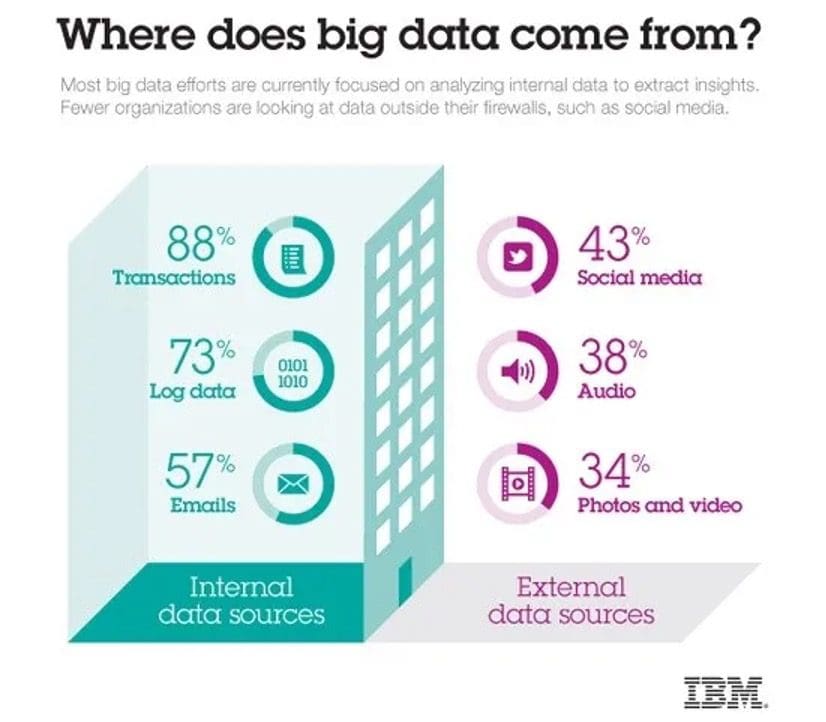Conversion Rate Optimization (CRO) refers to the act of bolstering the ratio of visitors who make a specific action on a website. While these actions can often involve making purchases, they can also involve signing up to a mailing list, or subscribing to an online service. As eCommerce becomes more competitive over time, more marketers are waking up to the importance of incorporating big data in a functional CRO strategy.
Although there’s no shortage of CRO tools that are designed to help marketers to make the most of their strategy, many modern solutions can risk obscuring more qualitative and humanized data in favor of raw numbers and figures.
Insights that can explain human behavior, and provide insight into why they’re making specific decisions on site.
Modern big data solutions have the power to provide qualitative data insights as well as vast levels of quantitative data, and will align your goals with established business needs and processes.
But how exactly are these qualitative data insights used to optimize CRO strategies for online businesses? Let’s take a deeper look at the vast potential of big data:
Understanding the Importance of Big Data
The importance of conversion rate optimization can’t be underestimated. Fundamentally, the act of unleashing your potential in securing conversion rates will make all the difference in securing your growth or futureproofing your endeavor.
Even if you’re a small business with relatively low monthly traffic rates, making adjustments to optimize your pages has the potential to increase the percentage of conversions that you’ll experience.
From choosing an appropriate domain name to selecting a web hosting company, building a functional eCommerce site is a delicate process, and any changes made can carry a profound impact on the experience that your customers will have on your pages.
With this in mind, incorporating and using big data is an extremely valuable tool that your business can tap into when maximizing conversion potential.

Big data insights can come from a wide range of sources, and both internal and external forms of insight can help you to fully understand where, why, and how you should make changes to your CRO strategies.
With this knowledge, you can be empowered to consider the bigger picture in your approach and to identify whether such changes can have a wider impact elsewhere within your broader approaches to marketing.
Fine-Tuned Targeted Campaigns
Campaigns run through social media or other digital channels are essential in fostering greater conversion rates for a digital business. Campaigns that are structured in a way that enables the broadest level of engagement and prospective leads.
Crucially, big data can be gathered on social media, which can help teams to better identify and follow trends and incorporate them into their marketing strategy.
One of the most vital areas of big data is its ability to predict the behavior of prospective leads. This enables businesses to accurately research intent while predicting customer preferences.
With the right predictive social media analytics tools like Sprout Social and BuzzSumo, marketers can gather actionable insights that can be used to analyze all customer characteristics like their buying habits, frequency of purchases, and the many factors and pain points that could impact their intent.
These insights can not only enable businesses to get their websites in order based on what their customers want, but their predictive nature empowers them to act faster than their competitors in avoiding prospective customer losses by adapting to emerging trends before they manifest for targets.
Delivering the Most Relevant Content
Not only can big data provide richly detailed insights into predictive consumer behavior, but it can also deliver a great deal of more relevant content for audiences.
Significantly, consumers are only ever willing to engage in content that’s relevant to their wants and needs. This pursuit of fine-tuning content creation to perfectly match what your audience is looking for is one of the biggest reasons why marketers seek out big data analytics.
Big data can deliver insights that can stretch far beyond the trends that are emerging within your existing customer base and can leverage highly personalized content that appeals on a far more individualistic level.
In exploring more micro and macro trends, businesses can not only win customers but retain them over a longer period of time.
Data at the Core of Personalization
Big data makes all the difference when it comes to businesses optimizing their conversion rates to prevent delivering generic experiences to their customers.
Gaining an insight into the level of data that reflects the customer lifecycle in its entirety from all touch points means that companies can track, monitor, and adjust each interaction a customer has with them.
These insights can provide businesses with essential insights into factors like:
- How their product is used
- Which emails customers interact with
- Each time a customer opens a support ticket
- Whenever a customer utilizes a live chat
This can help to deliver a more complete picture of exactly when pain points occur and how businesses can adapt their on-page SEO to eliminate emerging issues.
For instance, big data sets can help to remove the risk of redundancy in content. If your email campaign sees a lead open and read your content, it’s essential that you avoid displaying the same or similar copy when they click to visit your site.
Because big data insights can show which customers have interacted with your email campaign prior, it’s possible to personalize their experience on your website to ensure that they remain fully engaged in each aspect of your conversion funnel.
Building Greater Insights in the Cloud
Today’s insights are set to be bolstered with cloud computing. Because of the necessity of large computational power to facilitate big data, the continued growth of the cloud is set to deliver stronger, more targeted analytics in the mid-term future.
Cloud computing facilitates the utility of machine learning, AI, and advanced analytics to provide marketing teams with the flexibility necessary to shift workloads, avoid vendor lock-in, reduce expenses, and create new solutions when it comes to CRO.
Furthermore, developments in cloud services through renowned providers like AWS, Azure, and Google Cloud are making it far easier for businesses to operate big data tools for marketing purposes. This can make it possible to run complex analytics platforms and begin acting on insights within minutes.
Although the adoption of big data analytical tools can represent a seismic alteration in how businesses conduct their marketing, the quality of predictive insights and personalization that they’re immediately capable of delivering is such that decision makers are likely to see CRO improvements instantly.

